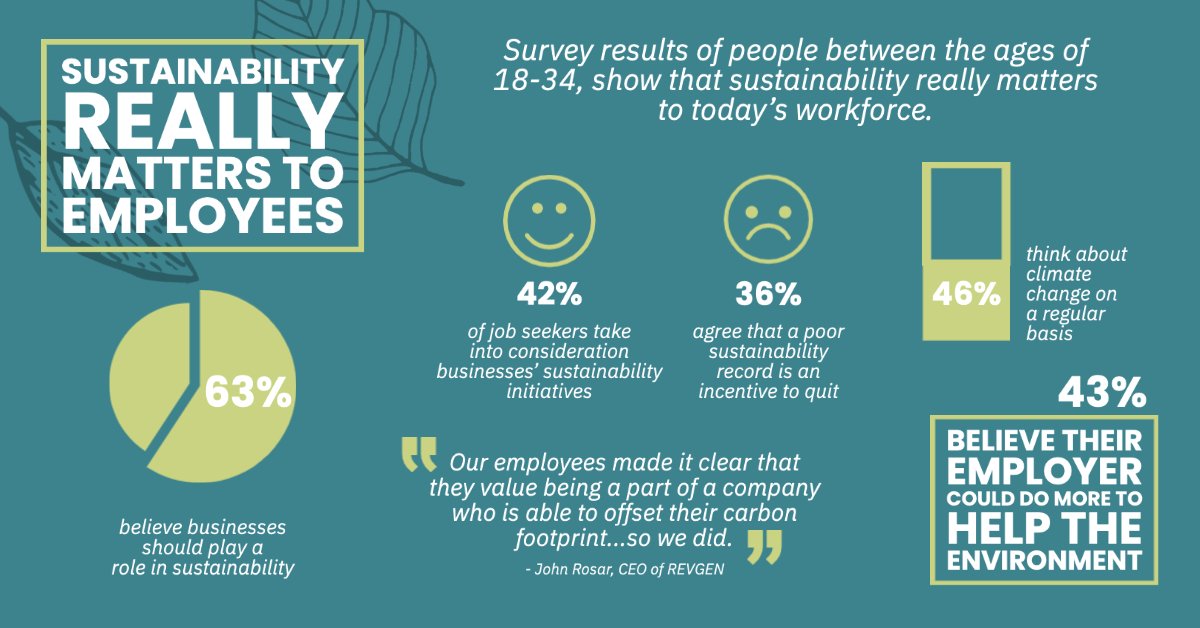The job market is hot: more people are switching occupations now more than ever before as young employees have the luxury to choose working with companies that don’t just fit their monetary and professional ambitions, but their climate goals as well. Climate change is an issue of growing importance, especially for millennial employees, who now make up the majority of the workforce.
Q2 2021 hedge fund letters, conferences and more
Gen Z Is Concerned About Sustainability
Generation Z, the youngest generation entering consumer markets, is more concerned about sustainability than any prior generation. It is important to remember that these practices should not be ad hoc executions. To establish strong trust and loyalty, brands must constantly communicate their efforts and deliver on their commitments.
This internal and external demand for climate-positive action is forcing workplaces to make big changes.
Small and mid-sized businesses are the backbone of our economy, making up nearly 50% of US GDP. In the march towards a more sustainable planet -- many businesses lack the tools and resources to effectively manage & reduce their footprint.
Also, recent data tells us that reducing your carbon footprint isn’t just good for the planet; it’s good for business.
Survey results of people between the ages of 18-34 reveal that sustainability really matters to today’s workforce.
46% of survey participants think about climate change on a regular basis.
This climate anxiety is influencing everyday decisions, including where people work. When asked, 63% of those surveyed agreed that businesses should play a role in sustainability, and 43% feel their employer could be doing more to help the environment.
This means that sustainability is becoming a requirement for businesses to compete for top talent.
Recruiting Top Talent
Recruiting top talent is key to being competitive. In order to do that, businesses need to implement sustainable practices, because 42% of those applying for new jobs take into consideration a company’s sustainability initiatives.
And, a lack of effort to reduce your carbon footprint can push top employees out the door. 36% of those surveyed agree that a poor sustainability record is an incentive to look for a new job.
Stef Walton is the Director of Human Resources at ArchiveSocial, and she understands the importance of corporate transparency when it comes to sustainability.
“Before people join the ArchiveSocial team, they want to know what we are doing as a company to be good community citizens,” said Walton. “People are expecting a lot more from their workplace, they expect them to be making an impact, by going carbon neutral I think our current and future employees will be more intertwined with the business.”
This tells us that becoming a sustainable business increases your company’s value. Environmental, social, and governance (ESG) propositions create value for businesses across every industry and sector. A report from McKinsey highlights the five essential ways how ESG connects to value creation, they are as follows: ESG facilitates top-line growth, reduces costs, minimizes regulatory and legal interventions, increases employee productivity, and optimizes investment and capital expenditures.
ESG Efforts Boost Employee Morale
From a benefits standpoint, ESG efforts attract new customers and boost employee morale. These efforts also help lower energy consumption and reduce waste. Lastly, ESG programs help companies earn subsidies, gain government support, as well as enhance investment returns. Overall, ESG matters, and companies cannot afford to ignore this business component.
So, as a business, you can’t afford to disregard your impact on the environment. But, where do you begin? The quest to become a more eco-friendly business can be overwhelming, especially for companies that don't have dedicated resources to manage sustainability initiatives.
Green Places to Work creates sustainability plans for businesses which enables them to contribute to global sustainability efforts quickly, effectively, at scale with a low annual cost. Once Green Places to Work has calculated a given company’s carbon footprint, the participating company can purchase a recommended carbon credit plan to offset it – the rest is maintained by the Green Places team, which also recommends other initiatives such as paperless billing and nightly computer shutoffs to further limit clients’ climate impact. The company’s first-of-its-kind service also helps customers promote their sustainability efforts to employees as well as clients, suppliers and partners.
Sustainability Impacts Customer Behaviors
Customers and employees care about climate change and sustainability, and these values impact customer buying behaviors and decisions. A good product is no longer enough. Consumers want to support brands that align with their priorities.
Todd Olson is the CEO of Raleigh-based software company Pendo and his company has gone carbon neutral largely because climate change is something on the minds of Pendo’s leadership and employees.
“I think a lot about how we are setting up our future generations for success. Working with Green Places is one way we can do that. It starts with a behavior change from lots of companies. We’re excited to play a part in that.”
Overall, sustainability is all about the long-term health and well-being of society and that is why the Millennial and Gen Z workforce is driving this change. They have a desire to work for a company that cares about their future and all the futures of generations to come. From recycling to reducing waste, to offsetting carbon footprints, sustainable business practices take on many forms. Every company can make a difference, and these differences directly impact the community.
About the Author
Alex Lassiter founded Green Places to make sustainability accessible for small businesses. As a business owner himself, he realized that it was difficult to do a great job on the climate while also running the day-to-day operations of the business. He's hoping to make that easier for business owners everywhere.














